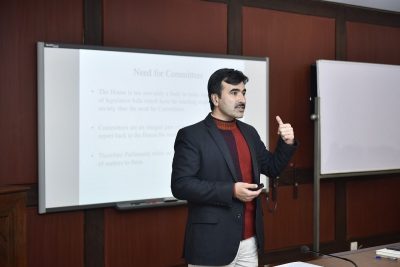
The Pakistan Institute for Parliamentary Services (PIPS) organized a one-day Orientation Session on the Working of the Parliament for the officers of the National Counter Terrorism Authority (NACTA) on January 29, 2025, at PIPS in Islamabad. The seminar was attended by around 21 participants including Director NACTA. Mr. Taj Muhammad, Deputy Director CB&D, moderated the event. The event began with a Quranic recitation, followed by welcome remarks by Mr. Muhammad Rashid Mafzool Zaka, DG (Research) of PIPS. He welcomed the participants on behalf of the President PIPS BoG / Chairman Senate of Pakistan, Honourable Syed Yousaf Raza Gillani and PIPS Team. He appreciated their eagerness for learning and sense of duty. The Director NACTA, Mr. Muhammad Iqbal Khosa thanked PIPS for offering an exceptional learning opportunity and emphasized on the importance of collective efforts in combating the menace of terrorism. The orientation session was designed covering working of the Parliament, covering legislative and non-legislative tools.
The first session, facilitated by Mr. Muhammad Rashid Mafzool Zaka, DG (Research) at PIPS, focused on the Working of the Parliament. He explained on how democracy in Pakistan has emerged from the Islamic concept of socialist democracy and provided intuitions into the vision of Quaid-e-Azam Muhammad Ali Jinnah. In the end, he shed light on some important articles of Constitution of Pakistan that explicitly deal with the functions of the Parliament.
In the second session, Taj Muhammad, Deputy Director CB&D, PIPS, focused on the “Non Legislative Tools in the Parliament”, with special focus on ‘Question Hour and Committees’. Committees are instrumental in dealing with the complex, varied and demanding nature of parliamentary business. It is common to setup committees to assist the Parliament in its task of reviewing legislation and scrutinizing government activities. He discussed how Parliament utilizes questions to oversee government activities.
In the third session, Mr. Abdul Nabi Solangi, Deputy Director Legislation, PIPS, focused on the “Legislative Business: From Bill to an Act”. He explained the law-making process in the Parliament. He explained that the journey begins with the introduction of a bill in either the National Assembly or Senate. The bill is then reviewed by committees, debated, and amended. Afterward, it is voted on by the House where it originated. If approved, the bill moves to the other House for a similar process. Once both Houses agree on the bill, it is sent to the President for approval. If signed, the bill becomes an Act and is officially enacted into law.
The orientation concluded with a Q&A session and group photo, allowing participants to clarify their doubts. The day ended with a visit to the Parliament House, offering officers a firsthand experience of the Parliamentary environment.